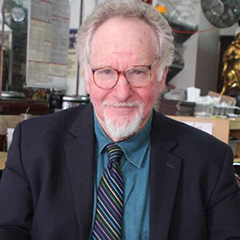By Erica Scalise

Mark Naison, Ph.D, has spearheaded projects for years as a member of the African Studies department. This month, with the help of several Fordham students, Naison created the Rose Hill Immigrant Defense Network.
Along with Raphael Zapata, Fordham’s chief diversity officer, Bronx community leaders, Fordham Law students and a mix of seven graduate and undergraduate students, Naison is working to help defend Bronx immigrants whom he said have given much to the community.
“I watched the Bronx burn and watched the crack epidemic hit the borough years ago,” said Naison. “Then, little by little I saw the Bronx start to come back through the work of Dominican, Mexican, West African and South Asian immigrants.”
Bronxites have grown increasingly frightened by anti-Islamic sentiments that have spread since the election of President Donald Trump, according to Naison. He said since the election, there has been an atmosphere of panic in the Bronx community.
The network aims to get legal information from immigrants into the hands of Fordham Law students and graduates. It will also work to tell the stories of immigrant contribution in the Bronx.
Immigrants have significantly reduced crime in the Bronx, according to Naison.
“The murder rate in 1992 was five times what it is now in the Bronx and these years since then have been a time of intense immigration,” said Naison.
The idea for a Fordham-based network came to Naison from Chaumtoli Huq, a human rights lawyer and founder of Law at the Margins, an organization that protects immigrant workers and and defends at-risk individuals.
Huq prompted the idea at one of three forums held this year by the Bronx African American History Project (BAAHP), Fordham’s research project dedicated to uncovering the history of the more than 500,000 people of African descent in the Bronx.
“At one of the forums, Chaumtoli asked if we at Fordham could create a network to help provide information, resources and political support for the Bronx community,” said Naison. “She pointed out that there is a similar effort at CUNY and I knew then that we had the responsibility to help spread something like this.”
Naison said that the forums for the BAAHP helped pave the way for the new Immigrant Defense Network.
“At the second forum this year we had about half of the people present from the Fordham community and half from the Bronx,” said Naison. “Someone at the last forum from Guinea said people were very concerned about these issues.”
Following these concerns, Naison’s latest project is working to dismantle these fears.
“At this point, we are there if there’s a crisis to help people. We don’t have ongoing projects and the network only been around for a week,” said Naison. “We don’t have a concrete plan. We are simply responding to appeals for help and are working to spread information that is valuable to advocates, immigrants and anyone working on this.”
Julia D’Ambrosio, FCRH ’19, is a research assistant for the Immigrant Defense Network. D’Ambrosio, who runs the network’s Facebook page, said this is more than just a project; it is network that fundamentally works to serve justice.
“Everyone who is an advocate for justice, lives in and appreciates the Bronx, and honors Fordham’s history as a institution [that] serves the nation’s immigrants, should come to the defense of these immigrants,” said D’Ambrosio.
In the process of creating the BAAHP and the Immigrant Defense Network, Fordham faculty, students and alumni have made strong connections with African community organizers and Imams from local Islamic centers, said many of the people involved.
Jane Edward, Ph.D, who works closely with the Bronx Muslim community, spearheads the network as well as Lisa Betty, a Fordham graduate assistant working to promote immigrant defense.
Aixa Rodriguez, FCRH ’00, GSE ’05, founder of Bronx Educators United for Justice, a social justice building network for parents and Bronx teacher worked to get the Immigrant Defense Network off the ground.
Naison said fighting for immigrant rights on Fordham’s campus is meaningful.
“A lot of immigrants are under daily, psychological assault. To be at a university like this and to be able to stand up for these people in a very public way means something,” said Naison.
“Everyone who loves justice, who loves the Bronx and who honors Fordham’s history as a institution serving the nation’s immigrants, should come to their defense.”






































































































































































































